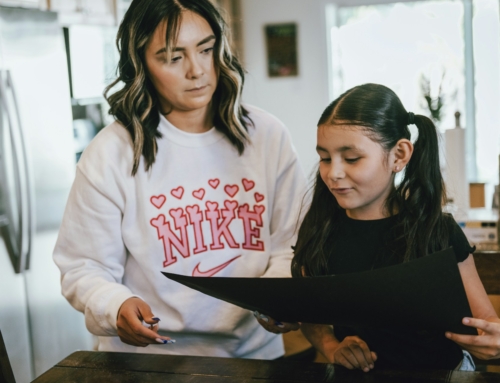At some point in our lives, most of us have felt a fear of abandonment. In childhood, we may have wondered if a parent was going to come back home after leaving us. As a teen, we wondered if our friends were truly faithful to us.
 In adulthood, we may have wondered if the person we were romantically involved with was going to stick around. A fear of abandonment is something the majority of people will feel at one point or another in their lives.
In adulthood, we may have wondered if the person we were romantically involved with was going to stick around. A fear of abandonment is something the majority of people will feel at one point or another in their lives.
For some people, these fears can become pervasive. They can interfere with daily life and even manifest themselves in unexpected ways. Those with abandonment issues from childhood trauma are at a higher risk.
Yet anyone can find themselves with struggles in this area. In this article, we’re going to look at what fear of abandonment is, possible reasons it develops, ways it manifests, and techniques for healing and coping.
What is the fear of abandonment?
The name sums it up. This is the fear of being abandoned. The fear can be fear of physical abandonment or emotional abandonment. Folks who experience this fear often find it difficult to maintain relationships.
Why do people fear being abandoned?
It’s hard to know exactly why this fear develops. Sometimes people can point to a specific event, often from childhood, in which they were abandoned or perceived themselves to have been abandoned. In other cases, it can take some work to figure out what’s going on.
The common element is that something happened to disrupt bonding and/or trust in a relationship. From that moment on, it is difficult to trust that others in the relationship will not leave or check out.
Childhood trauma is often the root of this fear. Perhaps a parent went away for an extended vacation or was not emotionally available during a difficult time. The death of a loved one also plays into this. The trauma doesn’t have to be something quite as dramatic as these examples either.
 Children process the world in different ways. Something seemingly minor and ordinary can have lifelong effects. Anything that the child perceives as an interruption to their attachment, bonding, or relationship may end up causing trauma.
Children process the world in different ways. Something seemingly minor and ordinary can have lifelong effects. Anything that the child perceives as an interruption to their attachment, bonding, or relationship may end up causing trauma.
Divorce is a common factor that contributes to this fear. This can be the case if the divorce occurred when a child was quite young, if the divorce resulted in one parent suddenly leaving, or if there was a lack of contact with a parent. This can be traumatic for all family members and manifest in different ways throughout life.
This develops often in adopted children as well. Bonding is disrupted by adoption which can lead to confusion and fear later on. Children who spent time in orphanages or children’s homes are especially likely to experience this fear. This is something pre-adoption counseling and information should cover.
How do I recognize the fear of abandonment?
This fear can manifest in several different ways that can often be damaging to existing relationships and thus creating a self-fulfilling prophecy. The individual believes they will be abandoned so they engage in behaviors to push others away. When the other person leaves, the abandonment is completed and fulfills the initial worries.
This is most often observed in romantic relationships, but friendships and family relationships can be affected as well. It can be helpful to know the most common ways this might manifest. One or two of these signs may develop, or they may all be present.
Signs of a fear of abandonment
- Jealousy of others, relationships, friends, partners, etc.
- Remaining in abusive or controlling relationships because of a fear of being alone
- Inability to trust the other person
- Hyper-focus on the failures and faults of the other
- Consistent overcommitment or being overbearing in relationships
- Pervasive thoughts of friends, partners, or parents leaving
- Avoiding deep relationships, or ending relationships before depth or substance develop
- Rapid attachment to others
- Pursuit of relationships with toxic and negative people
- Pushing others away when a relationship starts to feel serious
- Unrealistic demands on time, or hyper-controlling the other person’s schedule
- “People pleaser” behaviors
- Avoiding being alone
- Resentment or anger when the other person doesn’t spend time with them
- Low self-esteem
- Lack of belief in the worthiness of love
- Cheating
- Lying
- Manipulating
- Panic attacks
- Depression
- Anxiety
Infants and young children go through a natural and normal separation anxiety process. While this is rooted in fear of abandonment, it is a normal part of the developmental process. If you find yourself concerned by it, reach out to your counselor or pediatrician for help assessing whether it is normal or not.
A note on abusive relationships
 If you are in an abusive relationship and fear being alone, it is critical to get help and get out. No one can force you to stay in a relationship. If you’re unsure whether or not your relationship is abusive, it’s best to get help right away. Work through things with a counselor to determine if it is a safe relationship or not.
If you are in an abusive relationship and fear being alone, it is critical to get help and get out. No one can force you to stay in a relationship. If you’re unsure whether or not your relationship is abusive, it’s best to get help right away. Work through things with a counselor to determine if it is a safe relationship or not.
How to heal from and cope with abandonment issues
Managing these fears will depend on their intensity and pervasiveness. Anytime these fears take place, it is important to address them. Healing methods and coping skills can help people to develop full and meaningful relationships. Folks may also need to work to repair their existing relationships and heal damaged bonding.
Counseling is one of the most important steps to take, regardless of whether this fear has taken over your life and relationships or is something that creeps in on occasion. Exploring with a counselor and working through it together is of critical importance.
Counseling for adopted children, and their families, can help with abandonment issues too. The adopted child can learn how to trust their family, work through the fear of being abandoned, and process their experiences.
Adoption is a beautiful gift and healthy families are created through adoption every day. Adoptive parents sometimes forget that it can also be traumatic for many children. Processing this trauma can be hard and a counselor is a valuable resource.
Your counselor will help you develop coping skills and learn how to implement them as well. Here are some of the things you might expect to discuss during counseling, and coping skills you might work on:
- Learning emotional independence and resilience.
- Evaluating thoughts, feelings, and attitudes on your worthiness of love.
- Recognizing who your support network is and how to engage with them.
- Learning positive self-talk.
- Identifying triggers to fear.
- Overcoming patterns of behavior used to push others away.
- Learning to talk to others, especially your partner, about these fears.
- Working with those with whom relationships have been damaged to mend these relationships.
- Spending time realizing it is ok to be alone and learning how to be alone.
- Exploring God’s unending love.
- Wrestling with doubts, questions, fears, or confusion over the image of God as a loving Father.
- Spiritual practices to help build trust in God.
- Journaling.
- Meditation.
- Deep breathing.
- 1:1 or group work.
 If you or someone you know is suffering from fear of abandonment, now is the time to get help. Your counselor can help you identify the root of this fear. You’ll also work together to learn how to form healthy relationships and heal damaged relationships.
If you or someone you know is suffering from fear of abandonment, now is the time to get help. Your counselor can help you identify the root of this fear. You’ll also work together to learn how to form healthy relationships and heal damaged relationships.
If the fear came from a trauma of some sort, a counselor can be a gentle guide to walk through healing together. Now is the perfect time to seek help and find a life of health and hope.
“Rain”, Courtesy of Kristina Tripkovic, Unsplash.com, CC0 License; “Abandoned Building”, Courtesy of Gwendal Cottin, Unsplash.com, CC0 License; “Bible and Journal”, Courtesy of Carolyn V, Unsplash.com, CC0 License; “Touch the Sun”, Courtesy of Marc Olivier Jodoin, Unsplash.com, CC0 License










